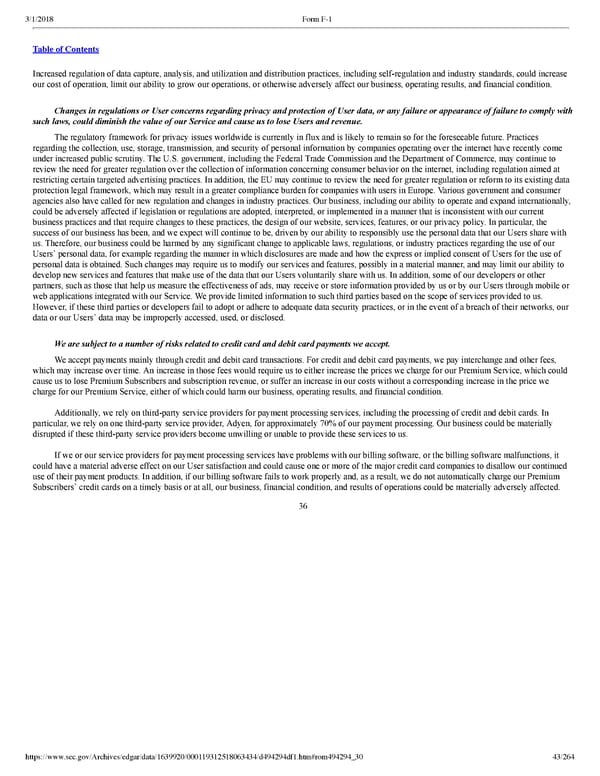43/264 Increased regulation of data capture, analysis, and utilization and distribution practices, including selfregulation and industry standards, could increase our cost of operation, limit our ability to grow our operations, or otherwise adversely affect our business, operating results, and financial condition. Changes in regulations or User concerns regarding privacy and protection of User data, or any failure or appearance of failure to comply with such laws, could diminish the value of our Service and cause us to lose Users and revenue. The regulatory framework for privacy issues worldwide is currently in flux and is likely to remain so for the foreseeable future. Practices regarding the collection, use, storage, transmission, and security of personal information by companies operating over the internet have recently come under increased public scrutiny. The U.S. government, including the Federal Trade Commission and the Department of Commerce, may continue to review the need for greater regulation over the collection of information concerning consumer behavior on the internet, including regulation aimed at restricting certain targeted advertising practices. In addition, the EU may continue to review the need for greater regulation or reform to its existing data protection legal framework, which may result in a greater compliance burden for companies with users in Europe. Various government and consumer agencies also have called for new regulation and changes in industry practices. Our business, including our ability to operate and expand internationally, could be adversely affected if legislation or regulations are adopted, interpreted, or implemented in a manner that is inconsistent with our current business practices and that require changes to these practices, the design of our website, services, features, or our privacy policy. In particular, the success of our business has been, and we expect will continue to be, driven by our ability to responsibly use the personal data that our Users share with us. Therefore, our business could be harmed by any significant change to applicable laws, regulations, or industry practices regarding the use of our Users’ personal data, for example regarding the manner in which disclosures are made and how the express or implied consent of Users for the use of personal data is obtained. Such changes may require us to modify our services and features, possibly in a material manner, and may limit our ability to develop new services and features that make use of the data that our Users voluntarily share with us. In addition, some of our developers or other partners, such as those that help us measure the effectiveness of ads, may receive or store information provided by us or by our Users through mobile or web applications integrated with our Service. We provide limited information to such third parties based on the scope of services provided to us. However, if these third parties or developers fail to adopt or adhere to adequate data security practices, or in the event of a breach of their networks, our data or our Users’ data may be improperly accessed, used, or disclosed. We are subject to a number of risks related to credit card and debit card payments we accept. We accept payments mainly through credit and debit card transactions. For credit and debit card payments, we pay interchange and other fees, which may increase over time. An increase in those fees would require us to either increase the prices we charge for our Premium Service, which could cause us to lose Premium Subscribers and subscription revenue, or suffer an increase in our costs without a corresponding increase in the price we charge for our Premium Service, either of which could harm our business, operating results, and financial condition. Additionally, we rely on thirdparty service providers for payment processing services, including the processing of credit and debit cards. In particular, we rely on one thirdparty service provider, Adyen, for approximately 70% of our payment processing. Our business could be materially disrupted if these thirdparty service providers become unwilling or unable to provide these services to us. If we or our service providers for payment processing services have problems with our billing software, or the billing software malfunctions, it could have a material adverse effect on our User satisfaction and could cause one or more of the major credit card companies to disallow our continued use of their payment products. In addition, if our billing software fails to work properly and, as a result, we do not automatically charge our Premium Subscribers’ credit cards on a timely basis or at all, our business, financial condition, and results of operations could be materially adversely affected. 36
 Spotify F1 | Interactive Prospectus Page 42 Page 44
Spotify F1 | Interactive Prospectus Page 42 Page 44